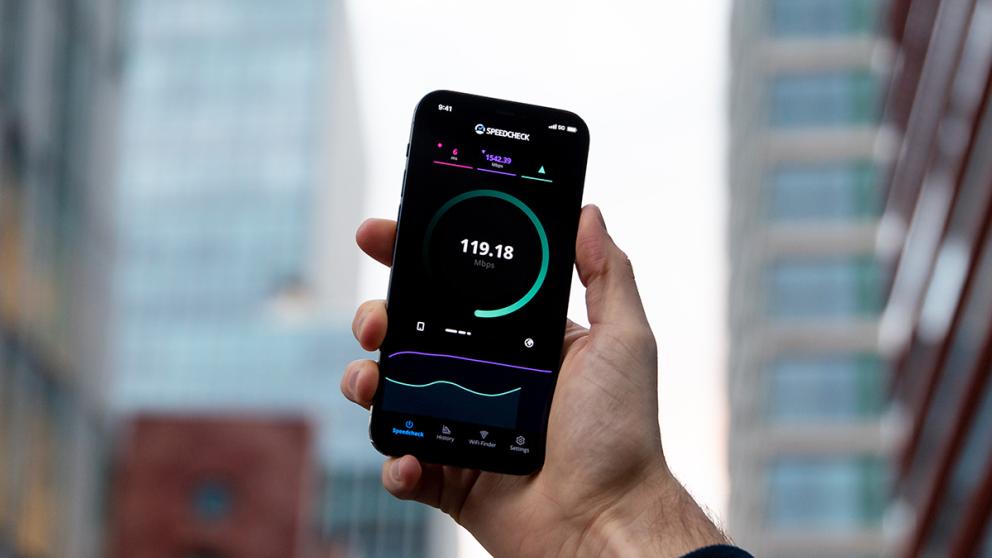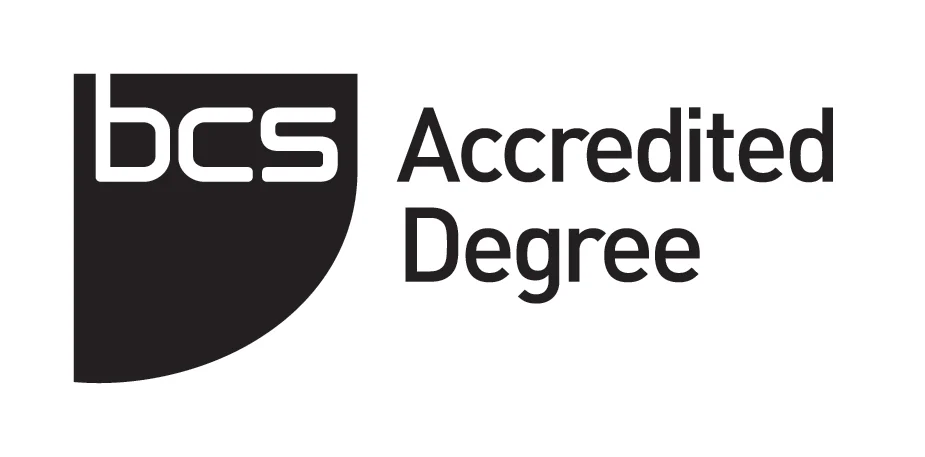
Internet of things with data science
Full-time
Part-time
One year
Two and a half year
September 2026
In a nutshell
Make discoveries in data and explore the value Internet of Things (IoT) can bring to businesses and organisations. With our Internet of Things with Data Science postgraduate degree, you can enhance your existing computer science knowledge, or gain new skills that can help you secure a role in a fastest-growing employment field in the digital economy.
Available with full and part-time study routes, the course provides you with specialist IoT and data science knowledge to apply in a wide range of sectors, including healthcare, commerce, professional services and the built environment. Start dates are available each January and September.
This degree has been accredited by BCS, The Chartered Institute for IT. Accreditation is a mark of assurance that the degree meets the standards set by BCS. A full CITP accredited degree entitles you to apply for professional membership of BCS and meets the evidence of breadth of knowledge in the assessment for registration as a Chartered IT Professional (CITP). A partially accredited degree provides a valuable contribution towards professional membership and evidencing breadth of knowledge. Some employers give preference to applicants who have accredited degrees, and an accredited degree is likely to be recognised by other countries that are signatories to international accords.
International applicant? Please check international intakes for the latest information and application dates.
Start your MSc Internet of Things with Data Science study journey
Register for our next Open Day where you can learn more about the course, tour our impressive new computing suites and meet the tutors
You will:
- Explore the full data mining lifecycle, from data pre-processing and exploratory data analysis to the application
- Develop an advanced understanding, and context of IoT, the skills, challenges, System Design and methodologies
- Learn about security vulnerabilities and challenges, including attack surfaces (networking, social engineering) and modern issues (IoT, Cloud).
- Complete high-level academic and practical work developing, evaluating and critically assessing a robust, scalable and usable IoT solution
students accepted
Course accreditations

This is for you if...
You want to enhance your existing skills and qualifications for a career move into Internet of Things application
You want to take your data science skills to the next level, ready to lead IoT projects
You're a knowledge-seeker and want to explore the possibilities that the Internet of Things opens up
All about the course
Course delivery
The course is delivered through a range of highly-focused modules. The 180-credit MSc award comprises four taught modules, plus a research dissertation. The 120-credit PgDip award comprises four taught modules.
Flexibility is at the heart of our learning approach. You can choose to study this postgraduate course full-time or part-time on campus, with start dates in January and September:
- Full-time students will complete taught modules in each of the first two trimesters, and complete the 60-credit dissertation project in trimester three
- Part-time students will complete taught modules in years one and two
The course timetable is designed to allow students with other commitments to structure their week around teaching sessions.
Course content
The curriculum is designed to upskill and empower graduates and professionals with limited prior subject knowledge of IoT, so they are ready to take up exciting, data-driven career opportunities. Through our industry-focus, we invite speakers from major companies and employers to participate in course delivery, providing real-world case studies and projects.
Course topics include principles and design of IoT systems, advanced databases, big data tools and techniques, security and privacy, machine learning and data mining. We regularly review module content with our industry partners to ensure the knowledge and skill set you will develop reflects trends and needs within professional and business communities. Learn more about the current course modules in the section below.
Course team
The Internet of Things with Data Science postgraduate course is delivered by an academic team with extensive industry experience and research connections, and a track record of developing solutions through industry partnerships.
Course leader: Professor Mo Saraee
Machine Learning and Data Mining
This module will help you to explore the full data mining lifecycle, from data pre-processing and exploratory data analysis to the application and evaluation of supervised and unsupervised machine learning algorithms.
Through practical, hands-on workshops using Python and Microsoft Azure Machine Learning, you will gain experience at using machine learning and data mining tools and techniques to extract insights from data.
Principles and Design of IoT Systems
This module will provide you with the history, advanced understanding, and context of IoT, the skills, challenges, System Design and methodologies the term implies. You will learn about the architectures to develop an IoT application using wearable sensors. You will experience all the stages in the design and implementation of a complex system, from its specification to the demonstration of a working prototype.
During this module, you will cover aspects of embedded systems programming, sensor data analytics using machine learning methods, user interface design, system integration and testing.
Applied Computer Vision
This module develops a rigorous and practice-oriented understanding of computer vision, including within the context of data driven IoT applications. You will learn the key ideas behind how machines interpret visual information – from core principles (such as imaging, sampling, features and geometry) to the latest developments in deep learning and vision models, including CNNs, Vision Transformers, foundation models and large vision-language models. The module also introduces the growing role of generative AI in code generation, showing how Large Language Models can be used responsibly to build practical, end-to-end AI solutions. We take a community-based approach (for example, using Hugging Face) and teach you to work effectively with AI systems – including how to write clear, reproducible prompts, evaluate AI-generated code, and ensure their solutions meet ethical and professional standards. The emphasis is on solving real-world problems through hands-on learning, with a focus on responsible AI use, reproducibility, and deployment in IoT and edge computing environments.
MSc Project
The project module aims to provide you with an opportunity to integrate learning from the course modules, working under the direction of an academic supervisor to carry out high-level coordinated academic and practical work on researching a suitable problem and developing, evaluating and critically assessing a robust, scalable and usable solution.
Plus, one module from the following options
Advanced Databases
This module will provide you with a broad overview of relational databases and Structured Query Language (SQL). You will learn the theory and practice of effective database design and will gain fluency in using SQL to query, extract and analyse data, and to create and manage databases. You will also learn key issues within the field of databases, including performance, indexing, security, recovery, and transaction management.
Big Data Tools and Techniques (AI)
This module will introduce you to Big Data, the characteristics that define it, and the challenges and opportunities it presents. You will learn how cloud computing, distributed data processing frameworks, and NoSQL databases can be used to ingest, process, analyse and store massive, complex datasets. Alongside this, practical workshops will give you hand-on experience working with a wide range of real-world datasets, including unstructured text data, image data and data from Internet of Things sensor networks. You will learn how to use Apache Spark to process large-scale data and apply data analysis, data visualisation and machine learning techniques.
We take a flexible approach to our course delivery that promotes diversity and inclusivity and provides a blended learning experience, which will vary to meet specific programme requirements. This learning time includes formal lectures and interactive activities such as seminars, tutorials, practical sessions, laboratory and studio learning. Smaller classes may be used to support collaborative activities such as project and group work and presentations. A range of different assessments and feedback is offered to meet the needs of both our diverse student body and specific subject needs.
Our postgraduate taught courses are normally made up of 30 credit modules which are equal to 300 hours of learning time, or 15 credit modules which are equal to 150 hours of learning time. A Master’s degree typically comprises 180 credits, a PGDip 120 credits, and a PGCert 60 credits.
Please note that exact modules and content offered may vary in order to keep content current and, for courses that offer optional modules, may depend on the number of students selecting particular options. When accepting your offer of a place to study on a programme with optional modules, you should be aware that optional modules may not all run each year. Your tutor will be able to advise you as to the available options on or before the start of the programme. Whilst the University tries to ensure that you can undertake your preferred options, it cannot guarantee this.
School of Science, Engineering and Environment
Rising to the challenge of a changing world, our postgraduate courses are designed to shape the next generation of urbanists, scientists, engineers, consultants and leaders.
Shaped by industry, and delivered by supportive programme teams, you can develop the skills to take your career potential further.
INDUSTRY COLLABORATION AND RESEARCH
When you start this degree course with Salford, you are joining a community making a difference in industry, our local region and in our wider society.
Many of our academics and technicians who support your course also lead collaborative, interdisciplinary, high-impact work in a range of local and global computing and informatics issues and challenges.
Discover how you are part of something bigger.
What about after uni?
EMPLOYMENT
Employment prospects for graduates of the MSc Internet of Things with Data Science are strong, given current and growing levels of demand in fields across health, finance, energy and transport, neuroscience companies and central government.
Demand for data science enabled IoT engineers outstrips supply and there is continued demand for qualified, talented graduates across many global industries. Equipped with this qualification, you will have a skill set and technical knowledge relevant for the IoT and Data Science job market.
Typical roles to consider once you graduate include IoT Product Manager, Supply Chain Transformation Manager, IoT Data Analyst, Big Data Engineer, and Business Transformation Manager.
FURTHER STUDY
You might also choose to take your subject interest further with postgraduate research. The Salford Innovation and Research Centre (SIRC) is home to Informatics PhD and Research Master’s opportunities in knowledge discovery and semantic web, software engineering, big data, data mining and analytics, cyber security, information visualisation and virtual environments.
Explore our Doctoral School to learn more about research training, support and opportunities.
What you need to know
APPLICANT PROFILE
This course is ideal for mathematics, computing or science graduates, and experienced professionals, eager to build skills in the growing IoT field.
ENGLISH LANGUAGE REQUIREMENTS
All of our courses are taught and assessed in English. If English is not your first language, you must meet our minimum English language entry requirements. An IELTS score of 6.0 (no element below 5.5) is proof of this, and we also accept a range of equivalent qualifications.
Read more about our English language requirements, including information about pathways that can help you gain entry on to our degree courses.
INTERNATIONAL APPLICATIONS
Please check international intakes for the latest information and application dates.
Undergraduate degree
The minimum requirement is a second class division honours degree or equivalent in any discipline, with previous demonstrable mathematical aptitude e.g. (A-level or BTEC Mathematics).
Accreditation of Prior Learning (APL)
We welcome applications from students who may not have formal/traditional entry criteria but who have relevant experience or the ability to pursue the course successfully.
The Accreditation of Prior Learning (APL) process could help you to make your work and life experience count. The APL process can be used for entry onto courses or to give you exemptions from parts of your course.
Two forms of APL may be used for entry: the Accreditation of Prior Certificated Learning (APCL) or the Accreditation of Prior Experiential Learning (APEL).
For more information or enquires about this scheme, please contact: AdmissionsSEE-PGT@salford.ac.uk
How much?
For students beginning their studies in January 2026, please see fees for 2025/26.
| Type of study | Year | Fees |
|---|---|---|
| Full-time home | 2025/26 | £10,350 per year |
| Full-time international | 2025/26 | £19,100 per year |
| Full-time home | 2026/27 | £10,620 per year |
| Full-time international | 2026/27 | £19,980 per year |
| Part-time | 2026/27 | Calculated on a pro rata basis |
Additional costs
Having your own laptop (16GB of RAM and an Ethernet port) is not essential, but it will give you more flexibility in where and how you engage with the software you will need to use during your studies (software is provided as part of the course).
You should consider further costs which may include books, stationery, printing, binding and general subsistence on trips and visits.
International student scholarships
If you are a high-achieving international student, you may be eligible for one of our scholarships. Learn more about our latest international scholarships.

